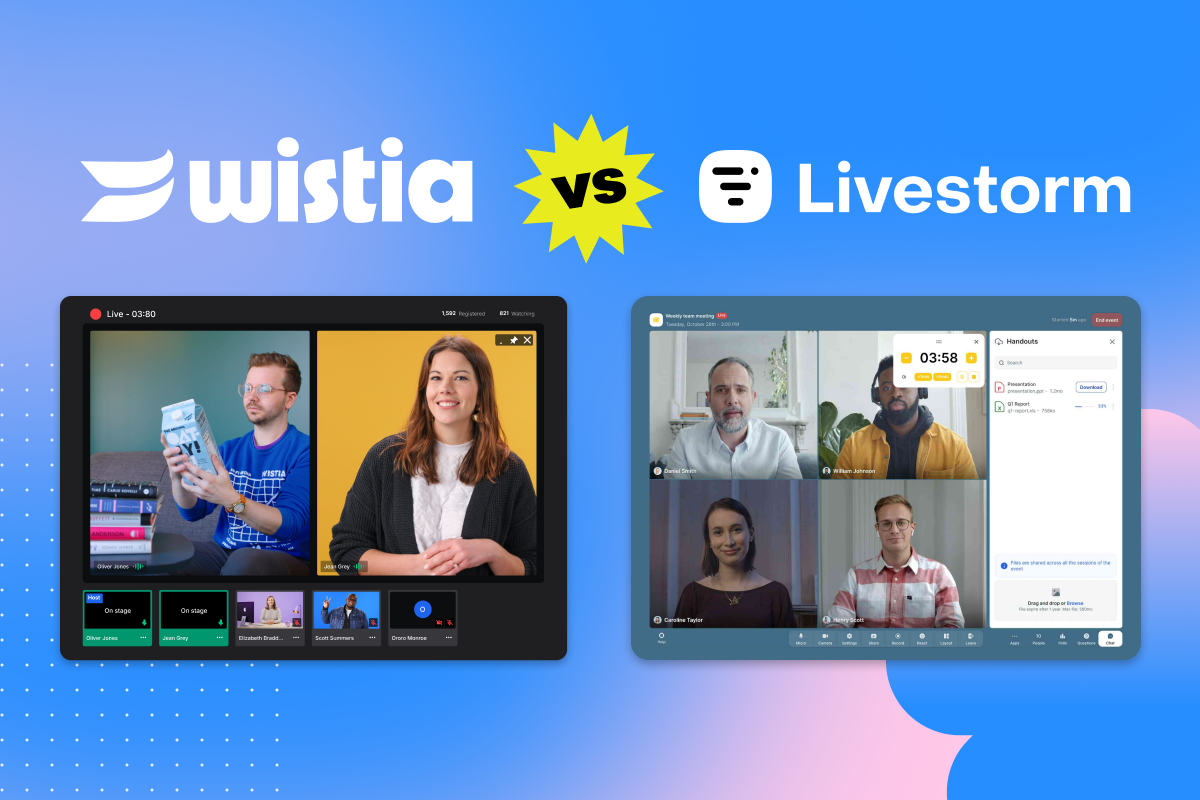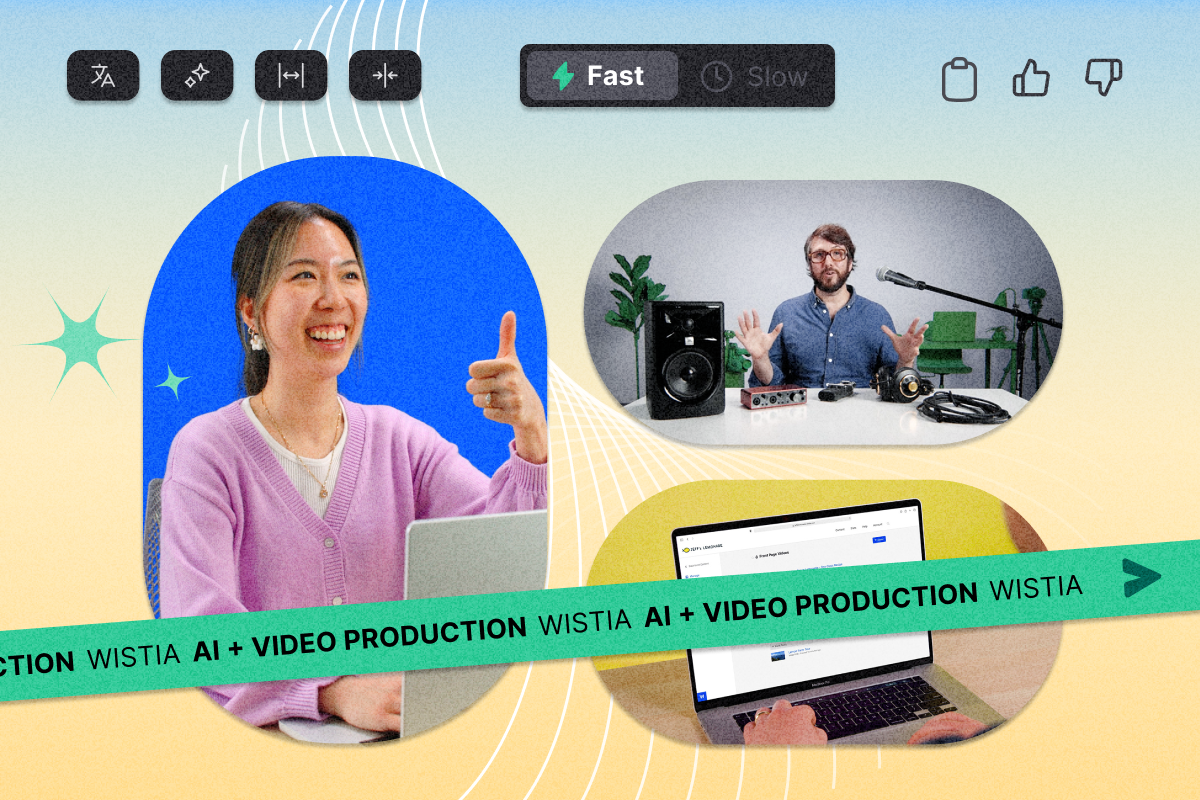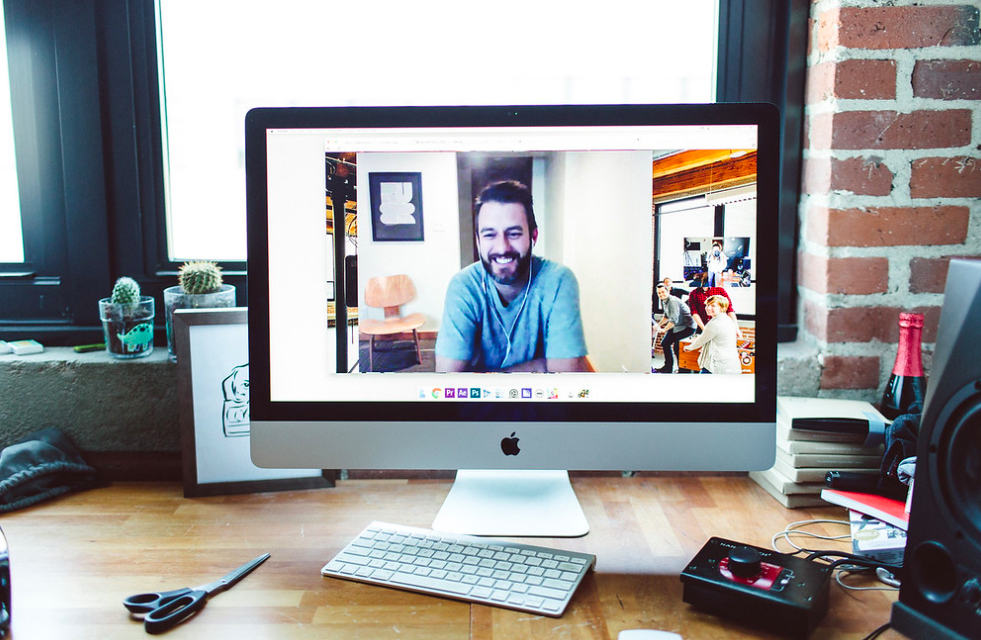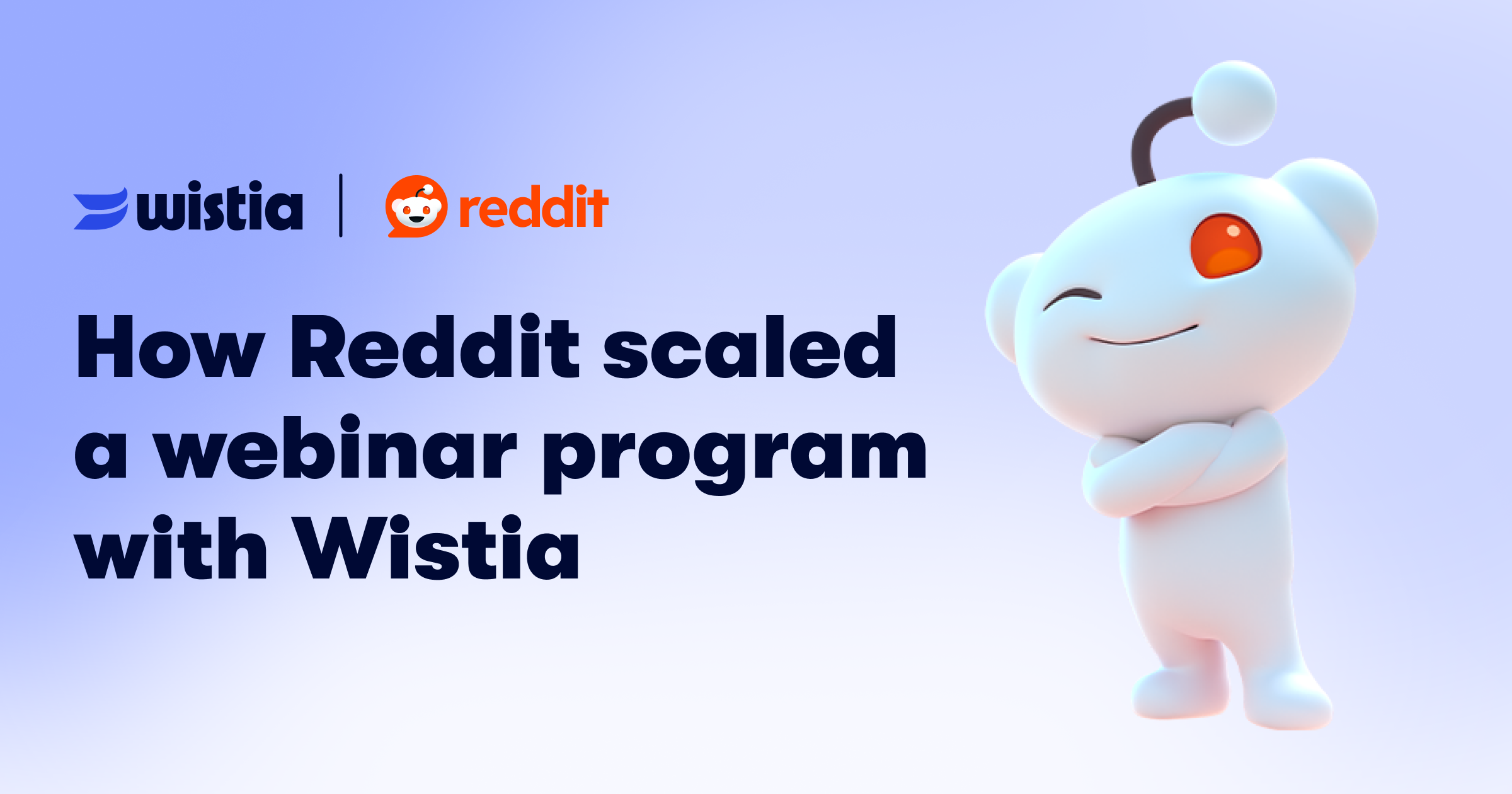Finding Your Inner Talk Show Host: An Interview with Chris Savage
September 30, 2019
Topic tags
Back in 2006 when Chris Savage first started Wistia, he probably didn’t expect he’d ever add “talk show host” to his resume. But now, thanks to Brandwagon, our new talk show for marketers, he can.
Savage stepped into the role of talk show host having no prior training, other than the experience he’s had being interviewed for other companies’ shows and podcasts. Now, he did have a little bit of an unfair advantage, as he’s had a number of public speaking engagements over the years and luckily isn’t exactly camera shy. But, nonetheless, this was a new experience for him and one that he certainly took seriously.
Throughout the process of filming Brandwagon, we’ve discovered that when it comes to being a great talk show host, having a strategy and giving it a lot of thought can take you further than simply being great on camera. So, if you’re considering starting an original talk show (and even being the host!) at your own company, read on to hear from Chris Savage as he shares his approach to interviewing guests.
Every talk show host has their own unique strengths and weaknesses, but in your opinion, what are some of the must-have qualities of a successful host?
Chris: It’s so important to be adaptable. You have to be able to go with the flow when interviewing someone. If you’re too rigid or, you know, stick too much to a script, you’ll miss opportunities to ask your guest questions that could potentially tell their story in an interesting way. I always say you should welcome tangents! I mean, again to a degree, but you want it to feel like a real conversation. It’s important to steer the ship, but a good interview will feel natural and off the cuff, while still being insightful and valuable for the viewers, and a lot of that rests on the host’s shoulders.
“A good interview will feel natural and off the cuff, while still being insightful and provide value for the viewers.”
Another thing that’s super important, and this is something you really can’t fake, but it’s so clear when the talk show host actually cares about and is genuinely interested in who they’re talking to. When they don’t, it’s so hard for the guest to be comfortable and get what they’re trying to say across. Then the interview ends up being hard to watch — and that’s not good for anyone! So, to me, it’s exceptionally important for the interviewer to keep an open mind about their guests and to be genuinely curious about what they have to say.
It sounds like making sure your guest is comfortable and relaxed is super important. How do you go about making your guests feel less nervous as you interview them?
Chris: I try my best to make guests forget the cameras are even there — helping them to be in a relaxed mindset. It’s tough! Even the most experienced public speaker can get nervous when they’ve got four cameras and bright lights pointing at them. One way I do that is by doing my research and surprising them with some unexpected, and sometimes personal, questions.
Like when we had Mark DiCristina, the Head of Brand at Mailchimp, on Brandwagon. I knew he and one of our lead designers, Dave, knew each other because they once worked together. So I asked Dave, “What can I ask Mark that he won’t see coming?” And he told me that Mark goes to the same taco place, Taqueria del Sol, every Monday for lunch. So when I first sat down with him, I was just introducing the episode, thanking him for being here, and then casually slipped in wanting to hear about his taco place. He was like, “What! How’d you know about that?” And then we started talking about how much he loves it, his order, and how often he goes. It immediately changed the tone of our talk and really helped him relax.
Another thing that I’ve found really helpful is to explain to the guest exactly how the show is going to work. By setting expectations up-front, it helps build trust from the start of our interview. I always encourage a really casual environment on set, something as simple as telling a guest that we can run through the questions as many times as they want or if they want to go back and change their answer, that’s totally okay. It’s really important for me to make sure the guest knows there’s no pressure for them to say something dramatic or controversial. We’re not trying to “break a story” with these interviews; we’re just trying to hear about their experiences and learn from them. And being upfront about that is key to making the guests comfortable on set.
If you were to boil it all down, is there any one thing you think makes an interview great?
Chris: A great interview is one that is super easy for the guest. One where they feel like they can just sit back, relax, and have a conversation about something they’re really interested in. Sometimes the host and the guest have a great chemistry that really works for the conversation. But for the most part, interviews are good when the host and their team did their prep work, have come up with good questions, and have done their best to make the guest feel relaxed.
“Interviews are good when the host and their team did their prep work, have come up with good questions, and have done their best to make the guest feel relaxed.”
Even the best-intentioned interviewer can wind up with a bad interview. What do you think makes an interview not go so well?
Chris: I think oftentimes, bad interviews really boil down to the teams not doing thorough enough prep-work. When an interviewer doesn’t do research or doesn’t have specific expectations for their guest, it really shows. For instance, say you’re a Brandwagon guest and you think you’re coming on to talk about your specific marketing experience, but instead I ask you general and vague questions about the industry that don’t necessarily let you talk about your expertise. That’s not great! It would just signal to the guest that I didn’t really care about their interview to do the research about them. And who wants to feel like that?
Kind of similarly, I think interviews that are far too broad can be boring for the viewer and the guest. For example, asking a guest to give an overview of their company might not be the best use of everyone’s time. That’s what websites are for! It’s better to go deeper to get to know the guest on a more personal level. Because — even if you have good intentions — when a guest feels like their time is being wasted, there’s a certain vibe that comes off and the audience can definitely pick up on that.
We’ve been talking pretty broadly about interviews. But, I would love to know what’s been your favorite part of hosting our show, Brandwagon, in particular?
Chris: I think it’s just really cool to be able to talk about a topic [marketing] that I’ve found interesting for my whole career and then do it in a really fun and creative way. I feel like I get to play pretend every day! I never thought I’d be in this position and nonetheless at Wistia. It’s really cool.
But beyond that, the interviews themselves have just been really interesting. When people watch the show they really only see a 10-minute clip, but we’re filming for about two hours with each guest. And every guest has just been so insightful. I’ve learned something new with each interview, which I feel really lucky to be able to do.
Something else I’ve enjoyed is learning about show production. Because we’ve been working on a weekly basis to produce this show (producing about one episode per week), every time we get into the studio we’ve been able to find ways to refine the process to make things run even more smoothly. Looking ahead, we know we want to keep making shows, maybe at the scale of Brandwagon, or maybe smaller. Either way, no matter what kind of show we want to make, this process has really helped us optimize our process!
Now, show creation isn’t without its challenges. What have you found to be the most challenging part of filming Brandwagon?
Chris: Well, since I’ve been learning how to be a good talk show host “on the job,” it’s been kind of a challenge to figure out my own process for doing prep-work and coming up with thoughtful questions. I knew that was part of the job, but I never knew exactly how I would tackle it myself. I’ve learned a lot there.
But, beyond that, I think the biggest challenge for me has been figuring out how to zero in on the heart of what someone is talking about. Like I said, I think tangents are great, and I think it’s super cool when people can just shoot the breeze with each other in an interview. But to sound like you’re just having a casual conversation, while still providing valuable insights and takeaways for the viewers — that’s hard to do! I didn’t realize that there’s actually a lot of strategy and practice that comes to play with pulling off a natural, valuable interview. You have to be thinking three, or four, steps ahead at all times, while still being engaged and responding in a genuine way.
“You have to be thinking three, or four, steps ahead at all times, while still being engaged and responding in a genuine way.”
To talk more about thinking ahead, it was also really hard for me to realize when to cut someone off. Of course, you never want to tell someone to flat out stop talking! But, learning the natural and appropriate places in a conversation to ask a follow-up question, or shift the conversation in a slightly different direction was hard, but so important.
Sounds like you’ve learned a lot as a new talk show host! What piece(s) of advice do you have for someone who wants to make a show for their business?
Chris: My first and biggest piece of advice is to be authentic — authentic to yourself and to your brand. Your brand matters, but even more than that, authenticity matters. If you’re hosting a show that’s supposed to represent your brand, but you’re trying to be something that you’re not, it’s just not going to work. You’ll feel it and chances are good that your audience won’t believe it, your guests may become disinterested, and your interviews just might end up not going very well. If you can’t tell, I feel super passionately about this.
But, being totally authentic in a show is definitely easier said than done. You really have to understand what your brand is and what it means if you’re going to “stay true to it.” So, do the work. Take time to invest in your team and work together to think about what you’re trying to get across. I mean, when I think about brand, I think back to our interview with Brendan Gaul from Brandwagon. He really got into what it means to get authentic about your brand. He was like, “If your brand was a song, what song would it be?” “If your brand was a smell, what scent would it be?” For us, we asked, “What car would we be?” After a while of doing this, we ended up with the concept for Brandwagon. But, if we didn’t take time to ask ourselves the right questions and deeply understand our brand, I would never have been able to be an effective host, and the show itself would not have taken off.
And last but not least, speaking from your totally unbiased opinion (wink, wink) why do you think someone should watch Brandwagon?
Chris: If you’re interested in marketing in any capacity, Brandwagon is a perfect show for you to watch! We’re really going deep with experts in the field and giving people permission to invest in brand marketing, but doing so in a relatable way.
One of my favorite moments was from our episode with Veronica Parker-Hahn. It blew my mind! She told us how she grew Oscar Health from 10 employees to over 1,000 in just one year and brought them from a 0% to a 43% general awareness rate. Like, you aren’t hearing this kind of story anywhere. Well maybe other places, but I hadn’t heard those details until she was on Brandwagon! It really is the place to find marketing insight that isn’t being talked about in a lot of other spaces.
Become the host you were born to be
It’s not every day that you get the opportunity to be on a talk show. And maybe, like in the case for Chris Savage and Brandwagon, you make the opportunity for yourself by being your own talk show host. But no matter how you end up there, we hope these tips and tricks will help you understand more fully what it takes to make a great interview happen.
Now, we’re not the only ones who have thoughts on pulling off a great interview! Are you already a seasoned interviewer? How’d you get there? Let us know in the comments and share more about the art of interviewing!






